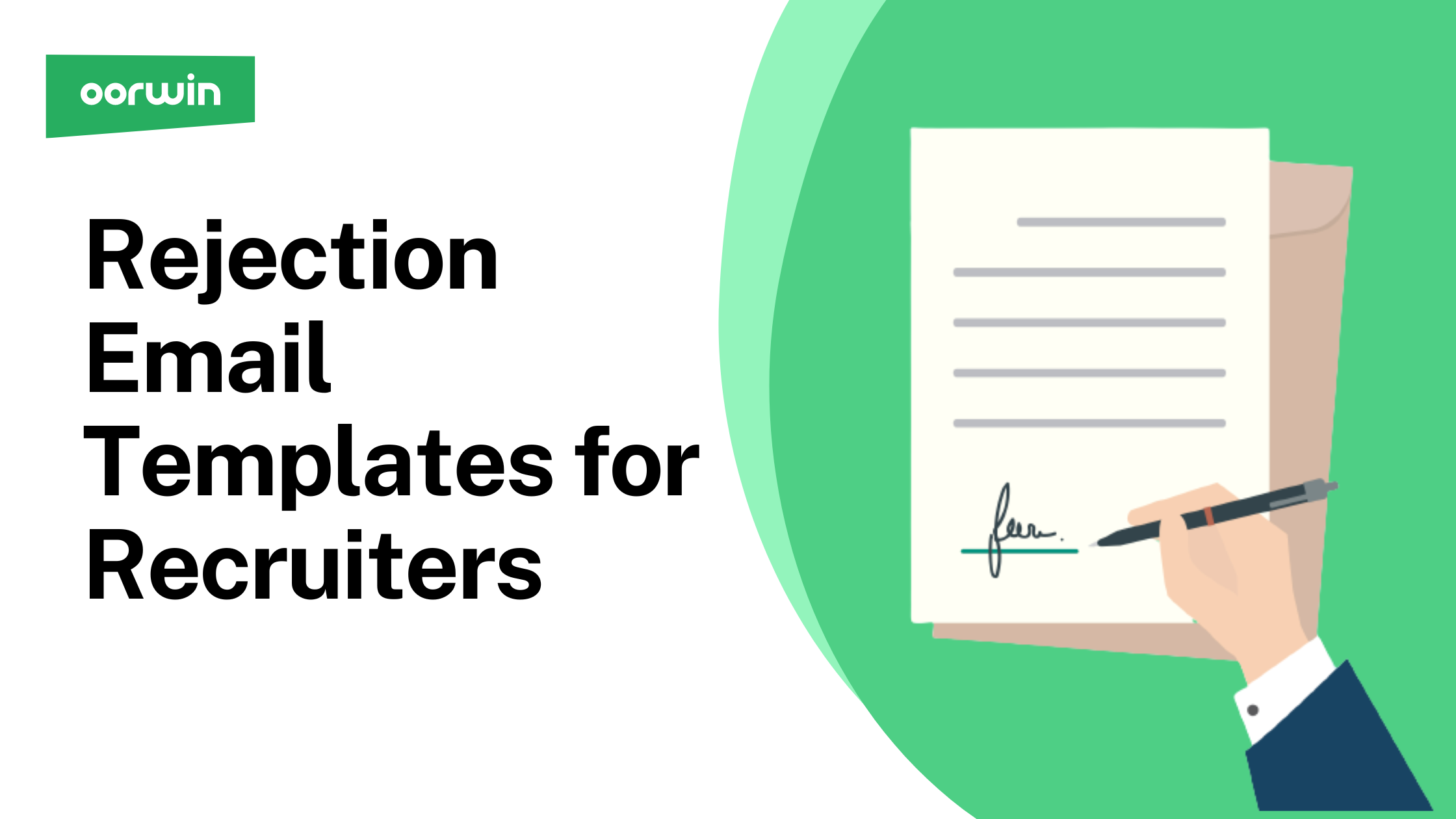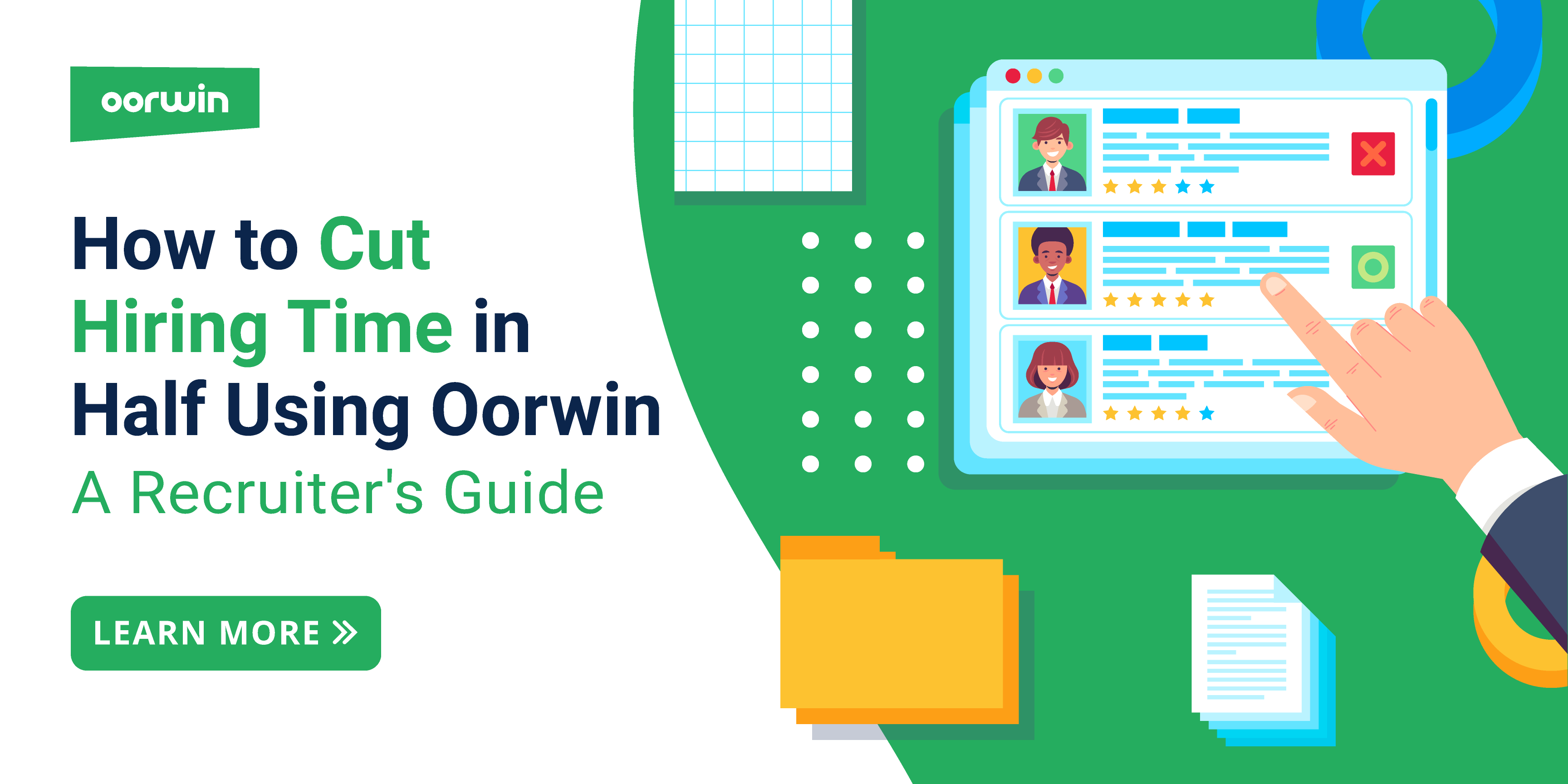7 Candidate Rejection Email Templates for Recruiters
Oorwin
4min read / 2 May 2023

Related Articles
Effective Candidate Rejection Email Templates for Recruiters
Job rejections are an inevitable part of the hiring process. Navigating the job rejection phase of the hiring process is as crucial as the selection itself. For candidates, receiving news of not being selected can be challenging, and how this message is conveyed plays a pivotal role in their experience. Crafting a professional and courteous rejection email is not just about delivering bad news; it’s integral to sustaining a positive candidate experience and upholding the company’s reputation.
Key Elements of an Effective Candidate Rejection Email
An effective job rejection email is a crucial component of the recruitment process, balancing professionalism with empathy. Let’s look at some elements to understand candidate rejection emails better.
Respect and Acknowledgement
Acknowledging the candidate’s time and effort in a rejection email is key. A respectful tone shows appreciation for their application process involvement and helps mitigate disappointment. This approach shows empathy, recognizing the effort they have put into applying for the position.
Positive Brand Impression
How rejections are handled can greatly influence a company’s reputation. Sending a considerate rejection email leaves a lasting, positive impression on the candidate. This may encourage them to reapply or recommend the company to others, enhancing the employer brand.
Feedback for Growth
Including constructive feedback in a rejection email demonstrates the company’s interest in the candidate’s professional development. This approach shows that the company values their potential, providing insights into how they might improve or fit into future roles.
Open Communication Channels
Crafting a rejection email that ends encouragingly keeps future communication possibilities open. It indicates to the candidate that the company values maintaining a relationship, potentially leading to future opportunities.
Stay connected with candidates seamlessly using Oorwin: Harness the power of WhatsApp integration to keep the lines of communication open for future opportunities.
Legal Compliance
A well-written rejection email ensures compliance with legal standards, clearly communicating the decision without ambiguity. Careful wording prevents misunderstanding or legal issues, maintaining professional and transparent communication.
Types of Candidate Rejection Email Templates
Various types of candidate rejection email templates correspond to different stages of the hiring process. The three most common templates are:
1. Post-application Job Rejection Email Template
This is sent to candidates who have applied for a position but didn’t make it to the next stage of the hiring process—sending this email as soon as possible shows respect for the candidate’s time and efforts.
2. Post-screening Job Rejection Email Template
This email is intended for candidates who have undergone screening but have yet to be chosen to proceed to the interview stage.
3. Post-interview Job Rejection Email Template
This is sent to candidates who have completed the interview stage but have yet to be selected. It’s essential to provide feedback in this email to help the candidate improve for future job opportunities.
Advantages for Employers in Using Candidate Rejection Email Templates
Employers often face the delicate task of sending rejection emails to candidates. Utilizing a well-crafted candidate rejection email template streamlines this process, offering several benefits:
- Consistency and Professionalism: A standardized rejection email template ensures a consistent and professional tone across all communications.
- Efficiency in Communication: Templates save time, allowing quick yet respectful responses to unsuccessful candidates.
- Maintaining Employer Brand: A well-written rejection email upholds the company’s reputation, showing that the employer values every candidate’s effort.
- Potential for Future Engagement: A courteous rejection email opens the door for future opportunities, maintaining a positive relationship with potential talent.
- Reducing Administrative Burden: With templates, HR can manage candidate communications more efficiently, reducing the workload of crafting individual rejection letters.
Top 7 Candidate Rejection Email Templates
Writing candidate rejection emails is a sensitive task, requiring a balance of professionalism and empathy. These emails are not just about delivering unwelcome news; they’re an opportunity to maintain a positive relationship with applicants and uphold your company’s reputation. Crafting a rejection email that is respectful, clear, and encouraging can leave candidates with a positive impression, even if disappointed.
Below are examples of effectively communicating a rejection while preserving a good relationship with the candidate.
Rejection Email Example 1
Dear [Candidate Name],
Thank you for submitting your application for the [Position] role at [Company Name]. We appreciate your keen interest in our organization and the effort you put into your application.
After carefully considering your application and many others, we regret to inform you that we cannot proceed with your candidacy. Our team has received numerous qualified applicants, and we cannot move everyone forward.
We want to inform you that we have carefully examined your application and appreciate the experience and skills you possess. Keep track of our website for potential job openings that suit your qualifications.
Thank you for considering [Company Name]. We appreciate your interest and wish you success in all your future endeavors. Thank you again for your time.
Sincerely,
[Your Name]
Rejection Email Example 2
Dear [Candidate Name],
We appreciate your interest in the [Position] role at [Company Name], and thank you for submitting your application.
We have reviewed all applicants and have decided to proceed with another candidate whose skills and experience more closely align with our needs. We recognize the value of your application and the time you took to apply.
We urge you to pursue your career objectives, and we hope you succeed in your job search. Kindly keep [Company Name] in mind for prospects that may suit you better. Thank you again for considering [Company Name].
Sincerely,
[Your Name]
Job Rejection Email Example 3
Dear [Candidate Name],
Thank you for meeting with us and expressing interest in the [Position] role at [Company Name]. We appreciate your insights and experiences shared during the interview.
Thank you for your interest in joining [Company Name]. After reviewing your application and those of other qualified candidates, we regret to inform you that we will not be proceeding with your application. The decision was based purely on the number of suitable candidates we received.
We want to acknowledge the value of your application, and we recognize the skills and experience you possess. We wish you the best of luck in your job search and encourage you to watch our website for future opportunities.
Thank you for your time and consideration.
Best regards,
[Your Name]
Job Rejection Email Example 4
Dear [Candidate Name],
Thank you for applying to the [Position] at [Company Name]. We were impressed by your qualifications and the dedication evident in your application.
After thorough consideration, we have chosen to move forward with a candidate whose experience more closely matches our current needs. This decision does not diminish the strong skills and experience you bring to the table.
We hope you continue to explore opportunities with us in the future and encourage you to apply for other roles that fit your expertise. Thank you again for your interest in
[Company Name].
Warm regards,
[Your Name]
Job Rejection Email Example 5
Dear [Candidate Name],
We contacted you regarding your recent application for [Position] at [Company Name]. Your background and skills are impressive, and we were glad to have the opportunity to consider you for our team.
After careful review, we have selected a candidate whose experience aligns more closely with the specifics of the role. We appreciate the effort you put into your application and encourage you to apply for future positions at our company that align with your skills and experience.
Thank you once again for your interest in joining our team.
Best wishes,
[Your Name]
Job Rejection Email Example 6
Dear [Candidate Name],
I am writing regarding your application for the [Position] role at [Company Name]. We are grateful for your time and effort in the application process.
After a comprehensive review, we have selected a candidate whose qualifications align with the position’s requirements. We recognize your potential and encourage you to keep an eye on future openings that may be a better fit for your unique skills and experience.
Thank you for considering a career with [Company Name], and we wish you the best in your ongoing job search.
Sincerely,
[Your Name]
Job Rejection Email Example 7
Dear [Candidate Name],
Thank you for your interest in the [Position] position at [Company Name] and for the time you invested in the interview process.
We have had to make some tough choices due to the high caliber of candidates, and we have decided to proceed with another applicant whose skill set aligns more closely with our current needs.
Your qualifications and professionalism left a strong impression, and we encourage you to apply for future opportunities that align with your expertise. We appreciate your interest in our company and wish you professional success.
Kind regards,
[Your Name]
Concluding Thoughts
Crafting a well-thought-out candidate rejection email is vital in maintaining a positive employer brand and respecting the candidate’s efforts. These templates balance professionalism and empathy, ensuring candidates are left with a favorable impression of the company despite not being selected. They encompass key elements like respectful acknowledgment, positive brand impression, feedback for growth, open communication channels, and legal compliance. Employers benefit from using these templates through consistent communication, efficient processes, and the potential for future engagement with talented candidates.
For a streamlined recruitment process, consider Oorwin’s ATS. It simplifies candidate management and enhances communication, ensuring a professional and efficient hiring journey. Discover how Oorwin can elevate your recruitment strategy today.
Frequently Asked Questions
How to write a candidate rejection email after an interview?
When writing a rejection email to a job candidate after an interview, it’s important to be timely and personalize it. If possible, professionally provide feedback and offer encouragement. Keep the email concise and proofread it carefully before sending it.
What are the benefits of a rejection email?
The benefits of a rejection email include the following:
- Maintaining a positive candidate experience.
- Building a positive employer brand.
- Encouraging candidates to apply for future opportunities.
- Providing constructive feedback.
How can a rejection email impact a candidate’s view of the company?
A well-written rejection email can significantly influence a candidate’s perception of a company. It demonstrates the company’s professionalism and commitment to respectful communication, which can leave the candidate feeling valued despite the rejection.
Popular Articles..
Blog

1min read / 25-Jun-2025
Master Effective Interview Techniques with Oorwin: A Step-by-Step Recruiter’s Guide
Blog
Blog
Get the latest Oorwin releases, updates, success stories & industry news
 Back
Back

